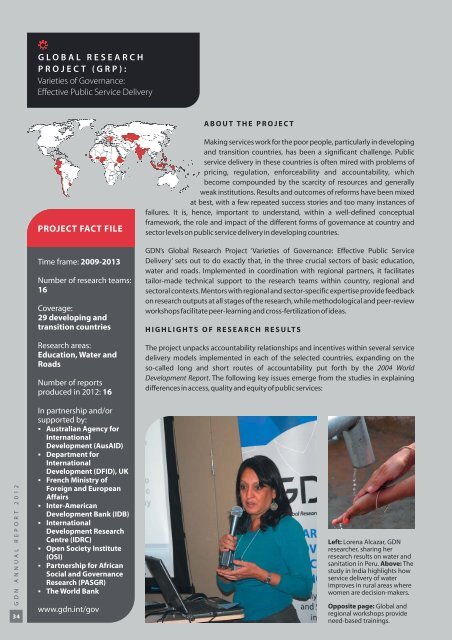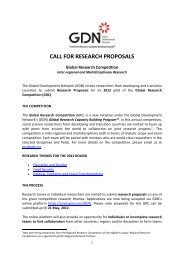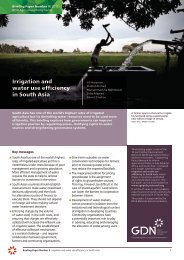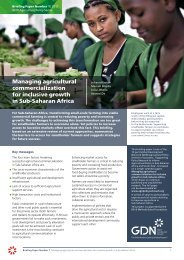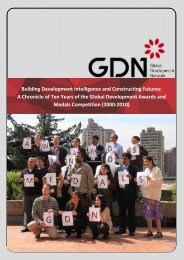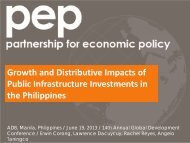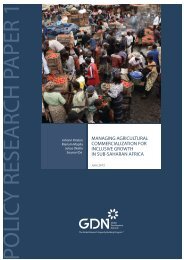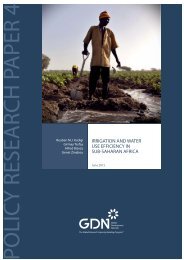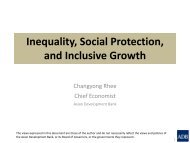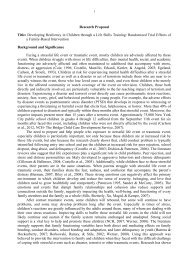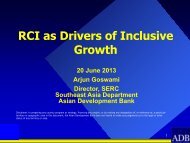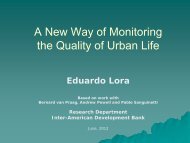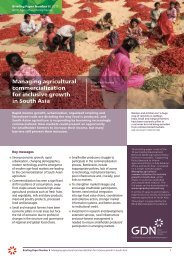ANNUAL REPORT - Global Development Network
ANNUAL REPORT - Global Development Network
ANNUAL REPORT - Global Development Network
You also want an ePaper? Increase the reach of your titles
YUMPU automatically turns print PDFs into web optimized ePapers that Google loves.
GLOBAL RESEARCH<br />
PROJECT (GRP):<br />
Varieties of Governance:<br />
Effective Public Service Delivery<br />
ABOUT THE PROJECT<br />
PROJECT FACT FILE<br />
Time frame: 2009-2013<br />
Number of research teams:<br />
16<br />
Coverage:<br />
29 developing and<br />
transition countries<br />
Research areas:<br />
Education, Water and<br />
Roads<br />
Number of reports<br />
produced in 2012: 16<br />
Making services work for the poor people, particularly in developing<br />
and transition countries, has been a significant challenge. Public<br />
service delivery in these countries is often mired with problems of<br />
pricing, regulation, enforceability and accountability, which<br />
become compounded by the scarcity of resources and generally<br />
weak institutions. Results and outcomes of reforms have been mixed<br />
at best, with a few repeated success stories and too many instances of<br />
failures. It is, hence, important to understand, within a well-defined conceptual<br />
framework, the role and impact of the different forms of governance at country and<br />
sector levels on public service delivery in developing countries.<br />
GDN’s <strong>Global</strong> Research Project ‘Varieties of Governance: Effective Public Service<br />
Delivery’ sets out to do exactly that, in the three crucial sectors of basic education,<br />
water and roads. Implemented in coordination with regional partners, it facilitates<br />
tailor-made technical support to the research teams within country, regional and<br />
sectoral contexts. Mentors with regional and sector-specific expertise provide feedback<br />
on research outputs at all stages of the research, while methodological and peer-review<br />
workshops facilitate peer-learning and cross-fertilization of ideas.<br />
HIGHLIGHTS OF RESEARCH RESULTS<br />
The project unpacks accountability relationships and incentives within several service<br />
delivery models implemented in each of the selected countries, expanding on the<br />
so-called long and short routes of accountability put forth by the 2004 World<br />
<strong>Development</strong> Report. The following key issues emerge from the studies in explaining<br />
differences in access, quality and equity of public services:<br />
GDN <strong>ANNUAL</strong> <strong>REPORT</strong> 2012<br />
34<br />
In partnership and/or<br />
supported by:<br />
Australian Agency for<br />
International<br />
<strong>Development</strong> (AusAID)<br />
Department for<br />
International<br />
<strong>Development</strong> (DFID), UK<br />
French Ministry of<br />
Foreign and European<br />
Affairs<br />
Inter-American<br />
<strong>Development</strong> Bank (IDB)<br />
International<br />
<strong>Development</strong> Research<br />
Centre (IDRC)<br />
Open Society Institute<br />
(OSI)<br />
Partnership for African<br />
Social and Governance<br />
Research (PASGR)<br />
The World Bank<br />
www.gdn.int/gov<br />
Left: Lorena Alcazar, GDN<br />
researcher, sharing her<br />
research results on water and<br />
sanitation in Peru. Above: The<br />
study in India highlights how<br />
service delivery of water<br />
improves in rural areas where<br />
women are decision-makers.<br />
Opposite page: <strong>Global</strong> and<br />
regional workshops provide<br />
need-based trainings.


